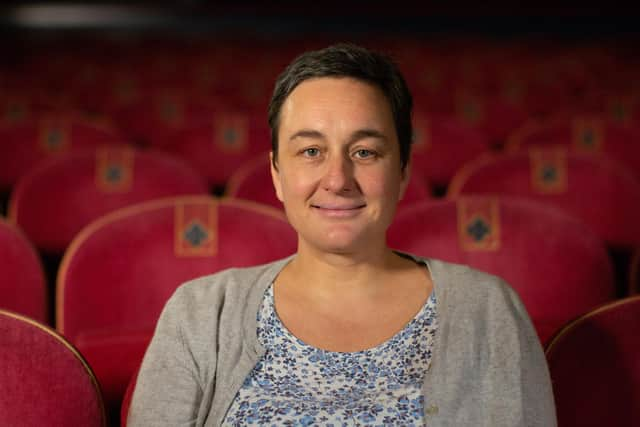Many Good Men: Clare Duffy on her new play exploring incel culture
Playwright Clare Duffy set up her company Civic Digits to consider what it means to live in a world dominated by the internet. With a commitment to equality, she wanted to ensure nobody got left behind in the rush for social media likes. She also wanted everybody, girls in particular, to flourish in this technological landscape.
And this landscape is not always pretty. Divisive opinions, once held only by crackpots, can wheedle their way into the mainstream through the weight of online numbers. Young people, those digital natives who have never known life without computers, must forge their own moral path in an attempt to distinguish the reasonable viewpoint from the voice of the zealot.
Advertisement
Hide AdTake incels. These self-styled “involuntary celibates” – straight men who cannot find a girlfriend – would formerly have been considered unlucky in love and nothing more sinister than that.
Now, through the power of online connectivity, incels have grown into a movement. Finding strength in numbers, many young men have turned their sexual rejection into a political crusade. Rather than accept their single status, they have become radicalised to believe women themselves are the root of their problem. A cocktail of misogyny and extremist politics has pushed some of them towards violence and even mass murder. In the past decade more than 60 people have been killed by men with incel beliefs.
You do not need to buy into incel culture to be influenced by similar ideology. Young men in great numbers have made a hero out of Andrew Tate, the former champion kickboxer. Admiring his philosophy of discipline, machismo and money-making, they see him as a role model.
Yet this is a man who once said he was "absolutely a misogynist" and someone who believed women to be "intrinsically lazy". His views count. Tate, who has claimed to be the world’s “most Googled man,” has 8.7m followers on X. What he says online has an effect on the real world.
Duffy wanted to know more about this. Working with Hearts football club, in association with Stories Untold and Stellar Quines Theatre Company, she spent time with two single-sex groups of 15–18 year olds, to create parallel plays about the online radicalisation of men. The play created by the girls is performed by professional actors at the start of the month and the boys’ version follows a fortnight later.


Straight away, Duffy saw a difference in how the girls and boys viewed the question. “The stories are really different and equally good,” she says. “I love the characters in the boys’ story and I love the analysis in the girls’ story. The girls wanted to think about the effects of pornography – it was a really big thing for them. They felt oppressed by pornography and saw it as a significant element in the radicalisation of young men.”
Advertisement
Hide AdCuriously, the boys said they had never heard the word incel, although they were aware of many associated terms, whereas the girls virtually gave a dictionary definition. “The young men did not have a lot of language to talk about masculinity and the pressures of it, whereas the young women had loads, which is the great legacy of feminism,” she says. “You want men to have language so they can think about their identities.”
With the boys, the conversation frequently gravitated towards Tate. “The positivity they see Andrew Tate offering young men is something, statistically, a huge percentage of young men also see,” she says. “What is it that makes young men feel they need that kind of positivity? What is it that’s scary about being a man?”
Advertisement
Hide AdBoth plays began with the same premise: an incel shooting has taken place in Edinburgh in the presence of two football players who become aware of incel culture for the first time. The footballers try to set up an internet campaign called Many Good Men to redress the balance, only for one of them to become radicalised himself.
“We try to unpick what the reasons might be that one person is more vulnerable than another,” says Duffy. “Or maybe we’re all vulnerable to radicalisation in different ways. We all experience fear and loneliness and all need to have a sense of where we fit into the group. If things go wrong with that, we can all be vulnerable.”
She adds: “We’re reframing the question from a more human point of view and away from a political way of thinking. The real problem is loneliness and a sense of not knowing how to be in your body. It’s a more difficult question. If you say it’s women’s fault, that’s easy.”
Using the forum-theatre technique pioneered by Brazilian activist Augusto Boal, the production asks the audience to make an intervention at the end of the story. “They have a chance to say, ‘OK, if we could make a change to this spiral into a really dark place, where would it be? What other character could we invent who could step in and do something different?’”
In a similar way, the young people have been able to explore their own values through fiction. “What worked beautifully was getting them to create a character who gets radicalised and ends up in a bad place,” says Duffy. “By creating those characters, they became incredibly empathetic and wise. Both groups created characters who had been witness to domestic violence in their youth – and that’s born out in the research. I didn’t show them that research, but they just made that empathetic leap.”
Many Good Men, Tynecastle Stadium, Edinburgh, 8–9 February and 26–27 February, see www.civicdigits.com